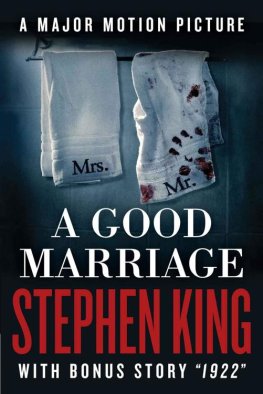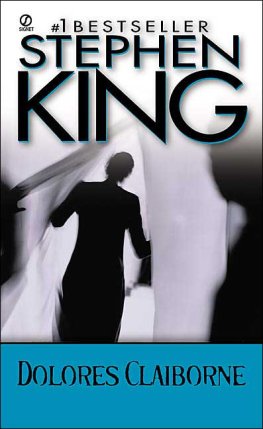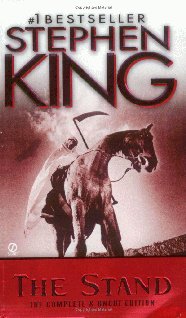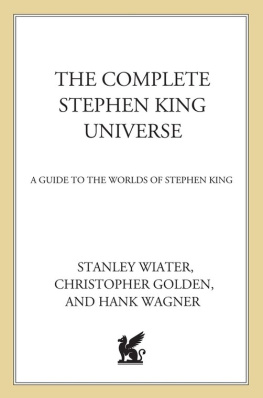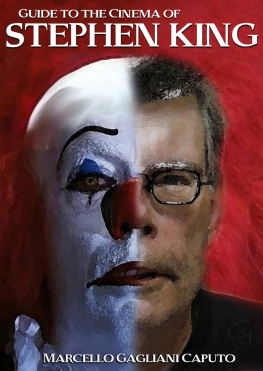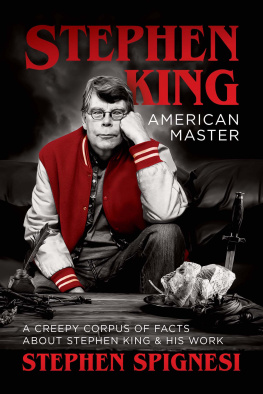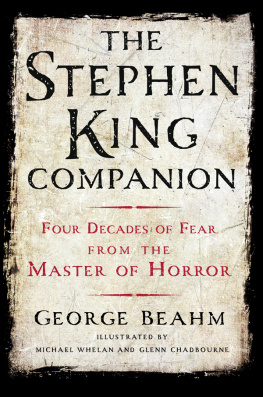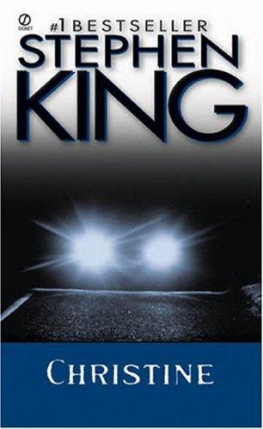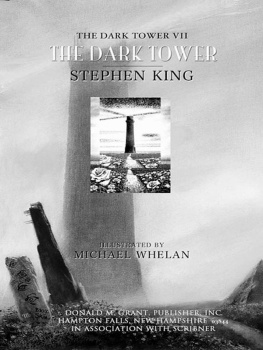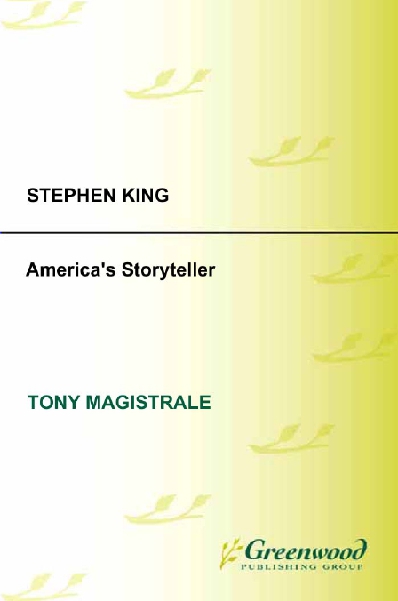
Stephen King
This page intentionally left blank
Stephen King
Americas Storyteller
Tony Magistrale
P RAEGER
An Imprint of ABC-CLIO, LLC

Copyright 2010 by Tony Magistrale
All rights reserved. No part of this publication may be reproduced, stored in a retrieval system, or transmitted, in any form or by any means, electronic, mechanical, photocopy- ing, recording, or otherwise, except for the inclusion of brief quotations in a review, with- out prior permission in writing from the publisher. Library of Congress Cataloging-in-Publication Data Magistrale, Tony.
Stephen King : Americas storyteller / Tony Magistrale.
p. cm.
Includes bibliographical references and index.
ISBN 978-0-313-35228-7 (hardcopy: alk. paper) ISBN 978-0-313-35229-4 (ebook) King, Stephen, 1947 Criticism and interpretation. Horror tales, AmericanHis- tory and criticism. King, Stephen, 1947 Film and video adaptations. King, Stephen, 1947 Characters Women. I. Title.
PS3561.I483Z775 2010
813'.54dc22 2009043306
ISBN: 978-0-313-35228-7 EISBN: 978-0-313-35229-4
This book is also available on the World Wide Web as an eBook. Visit www.abc-clio.com for details. Praeger
An imprint of ABC-CLIO, LLC ABC-CLIO, LLC
Cremona Drive, P.O. Box 1911 Santa Barbara, California 93116-1911 This book is printed on acid-free paper

Manufactured in the United States of America
Contents
Preface
Acknowledgments Chronology
vii xiii
xv
Chapter Chapter Chapter
The Writers Life: A Stephen King Biography
Tracing the Inuences: Regional and Literary
Institutions and Institutionalization: Evils Design and Heroic Rebellion
Chapter Sex with Consequences: Sexuality and
Its Discontents
Chapter
Why The Shining Still Matters: Revisiting
and Reinterpreting the Novel and Films
Chapter
Challenging Gender Stereotypes: Kings
Evolving Women
Chapter
Gothic Western Epic Fantasy: Encompassing
Works Cited Index
The Dark Tower
This page intentionally left blank
Preface
This book undertakes the intriguing task of wrestling with several impos- ing questions. How do we account for Stephen Kings enormous success both on best-seller lists and in movie theaters in light of a body of work that is so often critical of American life its institutions, gender myths and relationships, and small-town communities? How do we explain the phenomenon of Stephen King, who is, on the one hand, an embodiment of the Horatio Alger story, rising from obscure poverty to the Forbes list of wealthiest Americans, and, on the other hand, a politically subversive writer? Is Stephen King merely another popular purveyor of horror a hack , as some critics have insisted for years or does he have something important to say about America, its past and its future direction? Is the culture that has embraced Stephen King as Americas Storyteller, trans- forming him into arguably the most popular writer in history, reading him carefully enough?
Over the past four decades, Stephen Kings movies and books have made him one of the most recognizable names on the planet. Certainly part of his popularity comes from his visualization of the dark side, feed- ing the Western worlds postmodern fascination with indulging Gothic expressions in music and art. Kings narratives, however, are also associ- ated with describing very particular elements of America its positive and negative group dynamics, its post-Vietnam identity, New England as a dis- tinct regional place, to mention a few especially for people reading them in other countries. Ten years ago, I was riding in a train from Paris to Augsburg, Germany. I shared the car with twenty or so high school stu- dents from Munich returning from a week spent touring the City of Light.
viii
Preface
In casual conversation with several of the students sitting closest to me, I mentioned that I was an American and a professor of literature at the Uni- versity of Vermont. After asking questions to ascertain where Vermont was located in the United States was it somewhere near California, the uni- versal surprise that Vermont itself is a state my fellow travelers wanted to know about the courses I taught at UVM. When I mentioned my class entitled The Films of Stephen King, we immediately traversed both cul- tural and chronological differences. These teenagers didnt know much about Vermont, but they certainly had heard of Stephen King.
Each of my new friends had seen at least one Stephen King lm, often bearing a different title in its Teutonic translation, and just as many had read some of his ction in English. I was not surprised to learn that IT , Misery , and The Shining were the most popular among them, and some- what dismayed that none of these German children had even heard of Apt Pupil , Kings mesmeric dark study that weds a fugitive Nazi with a not-so- innocent American blue-eyed boy. The point is that for many people around the world, Stephen King represents more than just a good Gothic scare; he is also synonymous at least as much as the Dallas reruns dubbed on television and other ubiquitous elements of American popular culture, like Coca-Cola, that have found their way across the globe with what they know of America and the extent to which they can identify with it. That said, how many Americans have come to view King in the same light: as a chronicler of contemporary culture, as much a sociologist of postmodern American life as he is a tremendously gifted storyteller? Every artist is, at least in part, a product of his or her moment in time, even as that writer, if she or he is good enough, helps to dene that era for future generations. Thomas Hardys novels managed to capture the moment in which industrialization was transforming agrarian English life; Ernest Hemingway described the gap that existed between a generation of soldiers and artists who either fought in World War I or understood the cultural consequences attendant with millions dead and thousands maimed, and those who were insulated from the wars trauma; the British painter Francis Bacon captured on canvas the existential dread of modern man adrift in a universe where he is ultimately alone, bereft of God as well as a meaningful community of human others.
While Stephen Kings universe is really not so far removed from any of the artists described above, for four decades he has worked incessantly to produce his own inimitable portrait of America at the end of the twenti- eth century and into the twenty-rst. He has detailed the personal tragedies associated with divorce, alcoholism, and drug and child abuse. He has held a mirror up to our various prisons those constructed with
Preface
ix
tax dollars and cement as well as the invisible ones that exist behind closed bedroom and kitchen doors that we ourselves create. For several decades now, he has been warning Americans about the degradation of the environment most specically, of the consequences that ensue from unholy alliances between the military and science, which in turn lead to dangerous experiments and the unleashing of nightmares. He has found a persuasive way to connect monstrosity with the loss of childhood vision, and to critique adults who have fallen out of touch with their imaginative capacities. Supernatural vampires and monsters may be the great popular attractions long associated with Kings art, but at the heart of his best work is a deep-seated awareness of the very real anxieties about how Americans live and where we are going, as a nation and as individuals. More posi- tively, he has also provided us with a range of unlikely friendships that mirror the success of the American melting pot, fusing the differences that typically separate race, class, age, and even worlds. In short, in the past forty years, Stephen King has supplied America with a national portrait. It is not always a attering one, suitable for framing in the National Gallery or the White House, as it reveals our historical and cultural foibles and scars. But it also describes our transcendent, uniquely American survival instincts, fellowship, and acts of heroism from the least likely sources. This book is concerned with dening the particular American-ness of Stephen Kings ction and lms, from a biographical rst chapter tracing his formative years and rise to the status of Americas Storyteller, both in print and on Hollywoods big screen, to the second chapters exploration of some of Kings major inuences: as a New England regionalist profoundly shaped by his life in Maine as well as his extensive reading of other writers both in and outside the horror genre.
Next page

